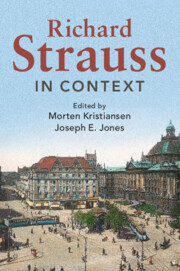Book contents
- Richard Strauss in Context
- Composers in Context
- Richard Strauss in Context
- Copyright page
- Contents
- Figures
- Notes on Contributors
- Preface
- Note on Translation
- Part I Family, Friends, and Collaborators
- Part II Career Stations
- Part III Cultural Engagement and Musical Life
- Part IV Professional and Musical Contexts
- Chapter 19 The Composer
- Chapter 20 The Conductor
- Chapter 21 The Orchestra
- Chapter 22 Program Music
- Chapter 23 Post-Wagnerian Opera
- Chapter 24 The Lied
- Part V In History
- Part VI Artifacts and Legacy
- Further Reading
- Appendix: Letters Bibliography
- Index
Chapter 23 - Post-Wagnerian Opera
from Part IV - Professional and Musical Contexts
Published online by Cambridge University Press: 08 October 2020
- Richard Strauss in Context
- Composers in Context
- Richard Strauss in Context
- Copyright page
- Contents
- Figures
- Notes on Contributors
- Preface
- Note on Translation
- Part I Family, Friends, and Collaborators
- Part II Career Stations
- Part III Cultural Engagement and Musical Life
- Part IV Professional and Musical Contexts
- Chapter 19 The Composer
- Chapter 20 The Conductor
- Chapter 21 The Orchestra
- Chapter 22 Program Music
- Chapter 23 Post-Wagnerian Opera
- Chapter 24 The Lied
- Part V In History
- Part VI Artifacts and Legacy
- Further Reading
- Appendix: Letters Bibliography
- Index
Summary
Of the German-language operas composed between Wagner’s Parsifal (1882) and Richard Strauss’s Salome (1905), only Humperdinck’s Hänsel und Gretel (1893) has survived. This chapter surveys the mostly forgotten works that form the context of Strauss’s early operas. In addition to his musical style, Wagner’s concept of redemption through love and reception of Schopenhauer’s metaphysics exerted a powerful influence on the next generation, as seen in music dramas by Max von Schillings (Ingwelde), Pfitzner (Der arme Heinrich), and Strauss (Guntram). The new genre of fairy tale opera (Märchenoper) often presented lighter versions of Wagnerian style and ideology, such as in Hänsel und Gretel, Alexander Ritter’s Der faule Hans, and Siegfried Wagner’s Der Bärenhäuter. Even comic opera was strongly influenced, bifurcating into Meistersinger spinoffs (Schillings’s Der Pfeifertag) and harmless bourgeois idylls (Eugen d’Albert’s Die Abreise). Verismo-influenced hybrids include d’Albert’s Tiefland and Wilhelm Kienzl’s Der Evangelimann. Strauss’s Salome represented an act of liberation.
Keywords
Information
- Type
- Chapter
- Information
- Richard Strauss in Context , pp. 209 - 217Publisher: Cambridge University PressPrint publication year: 2020
